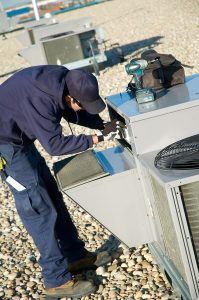 One of the common repair issues we often deal with when it comes to commercial air conditioning in Toronto and the Greater Toronto Area is refrigerant leaks. This isn’t a problem that only strikes residential equipment! If your facility uses refrigerant-based heat pumps or air conditioners, they can begin to leak refrigerant at almost any point in their service lives.
One of the common repair issues we often deal with when it comes to commercial air conditioning in Toronto and the Greater Toronto Area is refrigerant leaks. This isn’t a problem that only strikes residential equipment! If your facility uses refrigerant-based heat pumps or air conditioners, they can begin to leak refrigerant at almost any point in their service lives.
Refrigerant leaks require quick action to repair, otherwise the equipment is in danger of a full breakdown due to compressor failure. In this post, we’ve provided a list of ways to detect refrigerant leaks as early as possible so you can alert our technicians. We’ll work to avert greater problems and have your proper cooling restored.

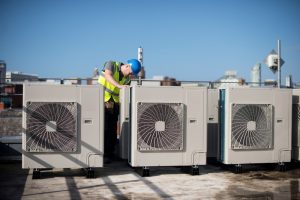 Rooftop HVAC units are among the most frequently employed climate control systems for industrial and commercial facilities. The typical rooftop HVAC unit is a packaged system containing a compressor, expansion device, condenser coil, evaporator coil, and powerful blower fan. Unlike split systems, which place some of their components indoors (the air handler and one of the coils), a rooftop unit handles the heating and cooling in one unit and then sends the conditioned air down into the building’s ventilation system.
Rooftop HVAC units are among the most frequently employed climate control systems for industrial and commercial facilities. The typical rooftop HVAC unit is a packaged system containing a compressor, expansion device, condenser coil, evaporator coil, and powerful blower fan. Unlike split systems, which place some of their components indoors (the air handler and one of the coils), a rooftop unit handles the heating and cooling in one unit and then sends the conditioned air down into the building’s ventilation system.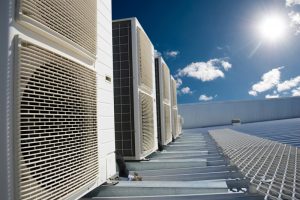 If you’re currently looking to install commercial or industrial HVAC equipment for your facility, you’ll immediately encounter the question of how powerful the equipment needs to be and how many units you’ll need to have installed to meet the climate requirements of the facility. In the HVAC industry, the job of determining the heating/cooling output requirements for new installations is called
If you’re currently looking to install commercial or industrial HVAC equipment for your facility, you’ll immediately encounter the question of how powerful the equipment needs to be and how many units you’ll need to have installed to meet the climate requirements of the facility. In the HVAC industry, the job of determining the heating/cooling output requirements for new installations is called 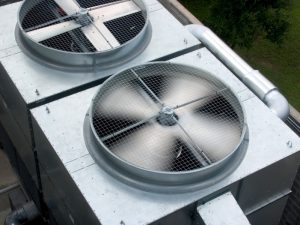 Commercial air conditioning systems consume a great amount of energy. Compared to the standard residential AC systems, a commercial system costs 150% to 200% more to run on average, and that doesn’t account for how much
Commercial air conditioning systems consume a great amount of energy. Compared to the standard residential AC systems, a commercial system costs 150% to 200% more to run on average, and that doesn’t account for how much  This is a difficult question to answer in a standard blog because the type of business has a huge effect on control of temperatures and humidity. The range depends on whether the HVAC system is being used primarily to provide comfort to people inside the facility or if it’s designed to protect equipment and process. A large industrial space will need much different amounts of cooling during the summer than a small office space.
This is a difficult question to answer in a standard blog because the type of business has a huge effect on control of temperatures and humidity. The range depends on whether the HVAC system is being used primarily to provide comfort to people inside the facility or if it’s designed to protect equipment and process. A large industrial space will need much different amounts of cooling during the summer than a small office space.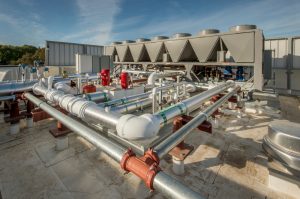 Providing air conditioning for a commercial or industrial facility is much different than air conditioning a residential home. Most houses use the same type of refrigerant-based split systems to provide cooling. There are some variations in design, such as ductless mini splits and packaged units, but they still operate on the exact same principles.
Providing air conditioning for a commercial or industrial facility is much different than air conditioning a residential home. Most houses use the same type of refrigerant-based split systems to provide cooling. There are some variations in design, such as ductless mini splits and packaged units, but they still operate on the exact same principles. 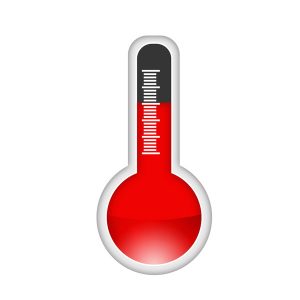 One of the most important commercial HVAC services we offer for our customers is cooling for a relatively small area of a facility. But it’s one of the most vital areas: the server room (also computer rooms and IT rooms).
One of the most important commercial HVAC services we offer for our customers is cooling for a relatively small area of a facility. But it’s one of the most vital areas: the server room (also computer rooms and IT rooms). 